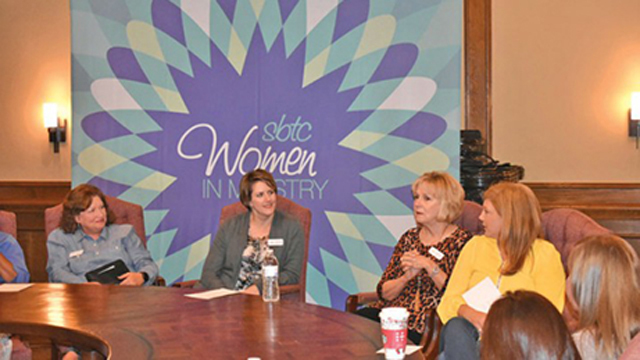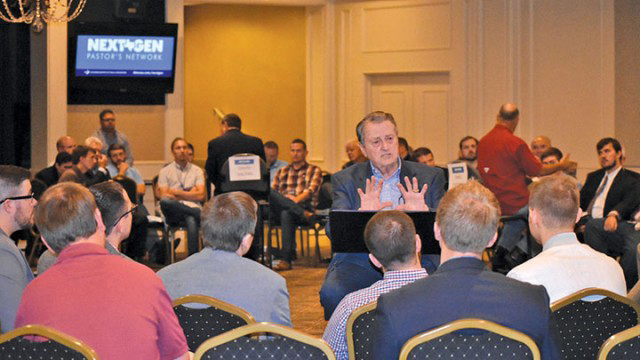
DALLAS (BP) — “Only 38 percent of evangelical pastors are under the age of 40, the lowest percentage in history,” Shane Pruitt, Southern Baptists of Texas Convention director of evangelism, told the Texan before the start of the SBTC’s Next Gen Pastors’ Network Roundtable at Criswell College.
More than 100 young pastors assembled in Criswell’s Horner Hall and library for breakout sessions, dinner and a panel discussion before the 2017 SBTC Annual Meeting convened. The Nov. 13 gathering marked the merger of Next Gen with another young pastors’ group, Forge, said Tony Wolfe, SBTC director of Pastor/Church Relations.
In addition to hosting events at the Texas annual meeting and Empower Conference, the Next Gen Network will sponsor five phone conferences scheduled every other month from January to September in 2018 featuring Southern Baptist leaders such as David Platt, Steve Gaines, Robby Gallaty, Frank Page and Jason Allen.
Wolfe praised the turnout at the Criswell meeting, the first portion of which was structured around six half-hour breakout sessions. Participants chose two sessions and sat in chairs arranged in semi-circles around presenters, a who’s who of pastoral experience, each concentrating on a “core competency” of pastoring, Wolfe explained.
Jimmy Draper, retired president and CEO of LifeWay Christian Resources, addressed leading and developing staff. Criswell College president Barry Creamer spoke on presenting Christ in the public square. Russ Barksdale of Arlington’s The Church on Rush Creek discussed discipling and leading one’s family. David Galvan of Primera Iglesia Bautista Nueva Vida in Dallas addressed personal evangelism. Chris Osborne of Central Baptist in College Station spoke on staying sharp in the pulpit. Danny Forshee of Austin’s Great Hills Baptist discussed creating a culture of prayer in the church.
 Following the breakout sessions, the group moved to Criswell’s library for a casual dinner and fellowship time, followed by a panel discussion featuring Draper, Creamer, Forshee, Galvan and Barksdale, attended by pastors and wives.
Following the breakout sessions, the group moved to Criswell’s library for a casual dinner and fellowship time, followed by a panel discussion featuring Draper, Creamer, Forshee, Galvan and Barksdale, attended by pastors and wives.
Before the panel, Wolfe introduced Nathan Lino, who spoke to the group about Southern Baptist life, including the function and importance of the Southern Baptist Convention’s giving channel, the Cooperative Program, which he called the “heart and soul” of the SBC.
“I am part of SBC life by choice for a few reasons,” Lino said of his 15 years as a Southern Baptist pastor. “I believe it’s the best vehicle for missions, church planting and revitalization, leadership training and cultural engagement.”
Lino noted the six to seven thousand missionaries deployed by the International Mission Board and North American Mission Board and discussed the importance of the Ethics & Religious Liberty Commission and SBC seminaries. He explained the place of “our state family,” the SBTC, and its “very effective ministries,” including church planting and revitalization.
Following Lino’s remarks, Pruitt welcomed the guest panel, who took turns responding to questions.
“If you now could go back and visit you as a leader in your twenties or thirties, what would you tell yourself?” Pruitt opened.
Draper mentioned his 68 years as a preacher and advised that “people are opportunities; they’re not obstacles.” Draper recommended building relationships with church members, discovering their needs and meeting them on “their own turf.”
“Be kind,” Draper added.
Galvan echoed Draper’s advice to “meet people where they are.”
“Just be faithful,” Forshee urged.
Creamer added he would focus on encouraging his people to “demonstrate the love of Christ.”
When Pruitt asked which preachers the panel listened to themselves, answers included Paige Patterson, Mark Patterson, Adrian Rogers, Jerry Vines, W.A. Criswell, Jimmy Draper, Tony Evans and Billy Graham.
Addressing tough times in ministry, the men discussed occasions where their churches lost members, difficult staff changes proved necessary, personal attacks occurred or a time when they faced job loss.
“People will disappoint you,” Draper said, advising that, when criticized, pastors must listen to see if the criticism is true and correct the matter if so. “You will never do well by attacking back,” he said. “Respond graciously. Treat people with courtesy.”
Draper noted that during the Conservative Resurgence, he learned, “You can be a strong conservative and be nice.”
The discussion also addressed coping with loneliness. “A pastor can be constantly around people and still be the loneliest person in the room,” Pruitt said. “Can you have good friends [in your congregation]?”
The consensus among the crowd was yes, although Forshee cautioned against showing favoritism. The panel stressed the importance of a network of accountability, too.
As for challenges facing pastors in the next decade, answers included the continued expansion of technology, cultural hostility to the church, issues of same-sex marriage, the struggle for sexual purity, the demands of the 24-hour society and declining contributions.
While their husbands attended the breakout sessions, 25-30 wives gathered for the Next Gen Pastors’ Wives round-table in the library conference room.
“A panel of seasoned pastors’ wives in full-time ministry for 25 years or more addressed a few questions and discussed various scenarios unique to a pastor’s family,” said leader Carolyn May, who co-hosted the group with Jennifer Garcia.
Discussion questions addressed included raising PKs (preacher’s kids), living in a fishbowl, handling criticism, serving out of giftedness, handling friendships and navigating family life.















